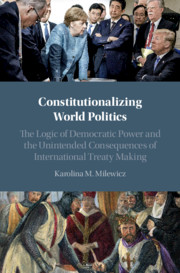 Constitutionalizing World Politics
Constitutionalizing World Politics from Part II - The Logic of Democratic Power in Treaty Making
Published online by Cambridge University Press: 21 July 2020
Moving from the grand and abstract theme of international constitutionalization to the more tangible and observable process of international rule making, Chapter 5 analyzes states’ motives for cooperating over international rules that form the unintended basis of international constitutionalization. It lays out the logic of democratic power, according to which states that are both democratic and powerful (democratic powers) combine the willingness and ability to promote international rules. Because democracies are rule–based, they understand the value of operating through rules and doing so is consistent with their domestic operations. Insofar as they are also powerful, democracies are able to advance their rule–based approach at the international level to shape rules according to their interests and values, which makes it easier for them to commit to and follow those rules. Democratic powers are thus decisive for international rule–based cooperation. States that lack either one or both of these prerequisites are less supportive of institutionalized cooperation and thus constitutionalization in world politics.
To save this book to your Kindle, first ensure no-reply@cambridge.org is added to your Approved Personal Document E-mail List under your Personal Document Settings on the Manage Your Content and Devices page of your Amazon account. Then enter the ‘name’ part of your Kindle email address below. Find out more about saving to your Kindle.
Note you can select to save to either the @free.kindle.com or @kindle.com variations. ‘@free.kindle.com’ emails are free but can only be saved to your device when it is connected to wi-fi. ‘@kindle.com’ emails can be delivered even when you are not connected to wi-fi, but note that service fees apply.
Find out more about the Kindle Personal Document Service.
To save content items to your account, please confirm that you agree to abide by our usage policies. If this is the first time you use this feature, you will be asked to authorise Cambridge Core to connect with your account. Find out more about saving content to Dropbox.
To save content items to your account, please confirm that you agree to abide by our usage policies. If this is the first time you use this feature, you will be asked to authorise Cambridge Core to connect with your account. Find out more about saving content to Google Drive.